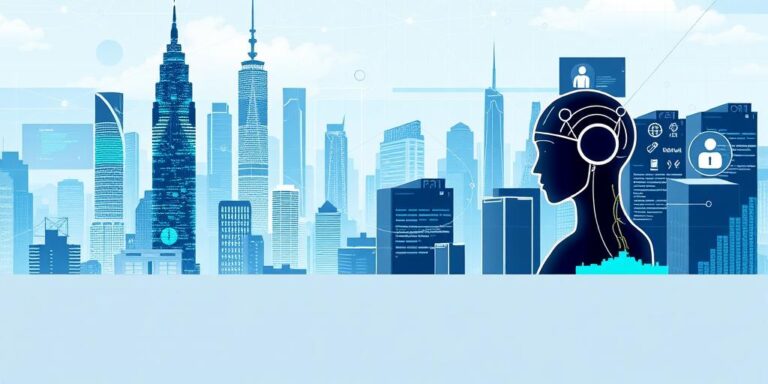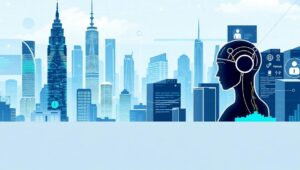The Future of Work: How AI Will Reshape Jobs by 2030
The integration of artificial intelligence (AI) into the workplace is no longer a futuristic concept; it’s a rapidly evolving reality. By 2030, AI is projected to significantly reshape the landscape of jobs across various industries. This article explores the key ways AI will impact employment, the types of jobs that will be most affected, and how individuals and organizations can prepare for these changes.
The Rise of AI in the Workplace
AI technologies, including machine learning, natural language processing, and computer vision, are becoming increasingly sophisticated. These advancements enable AI to perform tasks that previously required human intelligence, such as data analysis, customer service, and even creative content generation. As AI systems become more capable and cost-effective, businesses are incentivized to adopt them, leading to profound changes in job roles and workforce structures.
Key Impacts of AI on Jobs
- Automation of Routine Tasks:
- AI excels at automating repetitive and rule-based tasks. This includes data entry, invoice processing, and basic customer support. Consequently, jobs heavily reliant on these tasks are at high risk of being automated.
- Enhanced Productivity and Efficiency:
- AI tools can augment human capabilities, leading to increased productivity and efficiency. For example, AI-powered project management tools can optimize workflows, predict potential delays, and allocate resources more effectively.
- Creation of New Job Roles:
- While AI may automate some jobs, it will also create new opportunities. These include roles focused on AI development, maintenance, and ethical oversight. Additionally, there will be a growing demand for professionals who can work alongside AI systems to leverage their capabilities.
- Shift in Required Skills:
- The skills required for many jobs will evolve. Technical skills related to AI and data science will be highly valued, but soft skills such as critical thinking, creativity, and emotional intelligence will also become increasingly important.
- Personalized Customer Experiences:
- AI enables businesses to deliver personalized experiences at scale. AI-powered recommendation systems, chatbots, and targeted marketing campaigns will become more prevalent, requiring professionals who can manage and optimize these systems.
Jobs at Risk of Automation
- Data Entry Clerks: Automating data entry processes is one of the most straightforward applications of AI.
- Customer Service Representatives: AI-powered chatbots can handle routine inquiries, reducing the need for human agents.
- Truck Drivers: Self-driving trucks have the potential to revolutionize the transportation industry, displacing many drivers.
- Manufacturing Workers: Robots and automated systems are increasingly used in manufacturing, reducing the need for human labor on assembly lines.
- Financial Analysts: AI can analyze financial data and generate reports more quickly and accurately than humans.
Emerging Job Opportunities
- AI Specialists: Professionals who can develop, implement, and maintain AI systems will be in high demand.
- Data Scientists: Analyzing and interpreting large datasets will be crucial for organizations to make informed decisions.
- AI Trainers: Training AI models requires individuals who can provide feedback and refine algorithms.
- AI Ethicists: Ensuring that AI systems are used responsibly and ethically will be a growing concern.
- Human-AI Collaboration Specialists: Professionals who can bridge the gap between humans and AI, optimizing their collaboration, will be highly valued.
Preparing for the Future of Work
- Invest in Education and Training:
- Individuals should focus on acquiring skills that complement AI, such as critical thinking, creativity, and complex problem-solving. Additionally, learning about AI and data science can open up new career opportunities.
- Embrace Lifelong Learning:
- The job market is constantly evolving, so it’s essential to stay updated on the latest trends and technologies. Online courses, workshops, and conferences can help individuals acquire new skills and knowledge.
- Develop Adaptability:
- The ability to adapt to new situations and learn new skills will be crucial for success in the future of work. Be open to change and willing to take on new challenges.
- Focus on Human Skills:
- While AI can automate many tasks, it cannot replicate uniquely human skills such as empathy, communication, and leadership. Developing these skills can provide a competitive advantage in the job market.
- Organizations Should Invest in Upskilling:
- Companies should invest in training programs to help their employees acquire the skills they need to work alongside AI systems. This can help ensure a smooth transition and minimize disruption.
Conclusion
The future of work is being shaped by AI, and the changes are likely to be profound. While some jobs may be automated, new opportunities will emerge for those who are willing to adapt and acquire new skills. By investing in education, embracing lifelong learning, and focusing on uniquely human skills, individuals and organizations can prepare for the future of work and thrive in the age of AI.




